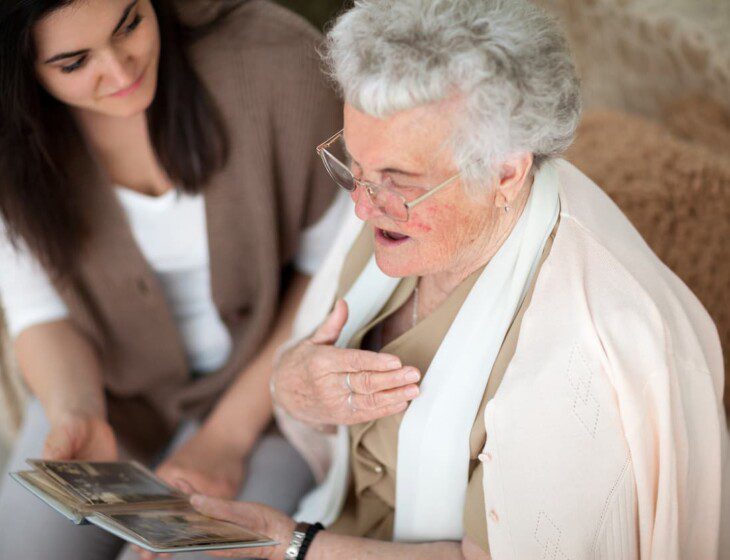Millions of Americans are living with Alzheimer’s disease, many of whom are age 65 or older. When an older adult begins showing signs of Alzheimer’s, it can be especially difficult for the friends and family around them. You may not know what to do or what they need from you, especially since the disease affects people in different ways. Knowing the common signs and symptoms and how best to support them, especially in the early stages of Alzheimer’s, can help you make informed decisions about the level of care they need to continue living a full life.
Common signs and symptoms of Alzheimer’s
Alzheimer’s is a disease that leads to a slow decline in memory, thinking and reasoning skills. So one of the most common signs that a person is in the early stages of the disease is simple memory loss, like forgetting important dates or repeating the same question over and over. Familiar tasks may become foreign to them. Tasks as simple as driving to a location they’ve been many times before or struggling to keep up their monthly bills.
Losing track of where they are or how they got there is also an indicator of early Alzheimer’s. They may put possessions in unusual places and forget where they left them. People in the early stages can also experience vision problems and have difficulty judging distance.
How to support your loved one showing signs of Alzheimer’s
It’s important to understand that life can go on even in the early stages of Alzheimer’s. People who are showing early signs of the disease are certainly going to need support, but adjustments will need to be made and precautions will need to be taken for their own safety.
Maintaining their health is the first step towards managing the early stages of Alzheimer’s. Promoting good eating habits and avoiding excess drinking will help your loved one remain at an appropriate weight while also keeping their blood pressure, cholesterol and blood glucose at healthy levels. Do what you can to reduce the number of stressors in their everyday life and make sure your loved one gets an adequate amount of sleep each night.
The level of independence a person can maintain while showing early signs and symptoms of Alzheimer’s will vary from one person to the next, but in many cases they are able to maintain a measure of independence with support from their friends and family. Simple cues and reminders may be needed to help with their memory, whether that means keeping up with appointments, remembering words or names, or keeping track of their medication.
Work as much as you can to help your loved one establish routines. Having a daily routine can keep them engaged and also help them get the appropriate amount of sleep. Additionally, developing a routine can help you identify and avoid situations that might stress them out.
Additional care options for people living with Alzheimer’s
Not everyone is able to provide the support their loved one needs during the early stages of Alzheimer’s. But there’s nothing wrong with asking for help and there are certainly resources available to you. Caregivers have often hired private pay services to provide in-home care and support for older adults showing signs and symptoms of Alzheimer’s. You may also be able to find volunteer programs within your local community that can provide in-home services.
It’s not easy to live your own life while supporting a loved one in living theirs. It’s a balancing act that is frequently easier said than done. If you’re a caregiver who needs help, you might want to explore senior centers and adult day services that can help your loved one during the day. You can run errands and get other things done while being able to trust they are in good hands.
Memory care services at Friendship Village of South Hills
Friendship Village is committed to providing the kind of memory care that you won’t find anywhere else. Our goal has been to foster a comforting environment in our health center, where our memory care residents can receive the compassionate support they need to continue living their lives. Our specialized memory care programming focuses on keeping residents engaged and allows them to develop daily routines that make every day purposeful and fulfilling.
We also have a dedicated memory nurse and certified nursing assistant on-site 24 hours a day to ensure our residents have assistance whenever they may need it. Specially trained staff members, including a memory care coordinator, are here to work with families to better understand and overcome the challenges of living with Alzheimer’s.
If you are considering a memory care community for a loved one living with Alzheimer’s or another form of dementia, let’s talk. Fill out the form below or call 724-941-3100.


